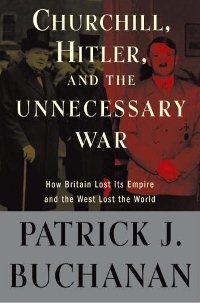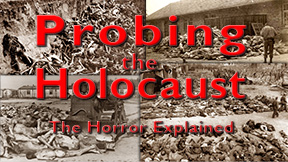Every year on May 8 “German” politicians and the media along with them celebrate the big national mea culpa. I won’t listen anymore. I haven’t listened to that in decades. So here is my take on the end of World War Two. I wrote the original version of this paper back in 1993, and, if I’m not completely mistaken, it was published in an issue of the Remer Depesche of that year. I pulled this paper out again some seven years later and published it in my then German magazine (“Englands Kriegsgründe für den Zweiten Weltkrieg,” Vierteljahreshefte für freie Geschichtsforschung 4(1) (2000), pp. 74-76). For this blog I’ve edited it a little and have added a few more thoughts. And the reference to Buchanan’s topical book is new, too, needless to say. Enjoy!
Four reasons are at times given why England entered into the Second World War and fought it out to its bitter end:
- in order to protect Europe from a dominant aggressive power;
- in order to liberate the world from a totalitarian regime;
- in order to liberate the German people from Hitler;
- in order to prevent the Jews from being complete annihilated.
Let us consider whether any of these reasons are tenable. We will do this by analyzing the situation before, during and after the war.

I recommend as further reading (though I do not necessarily agree with all of it): Patrick Buchanan, Churchill, Hitler, and the Unnecessary War. How Britain Lost Its Empire and the West Lost the World, 2008. Here is the author’s summary of the book:
Were World Wars I and II – which can now be seen as a thirty-year paroxysm of slaughter and destruction – inevitable? Were they necessary wars? Were the bloodiest and most devastating conflicts ever suffered by mankind fated by forces beyond men’s control? Or were they products of calamitous failures of judgment? In this monumental and provocative history, Patrick Buchanan makes the case that, if not for the blunders of British statesmen—Winston Churchill first among them – the horrors of two world wars and the Holocaust might have been avoided and the British Empire might never have collapsed into ruins. Half a century of murderous oppression of scores of millions under the iron boot of Communist tyranny might never have happened, and Europe’s central role in world affairs might have been sustained for many generations.
Among the British and Churchillian blunders were:
- The secret decision of a tiny cabal in the inner Cabinet in 1906 to take Britain straight to war against Germany, should she invade France
- The vengeful Treaty of Versailles that mutilated Germany, leaving her bitter, betrayed, and receptive to the appeal of Adolf Hitler
- Britain’s capitulation, at Churchill’s urging, to American pressure to sever the Anglo-Japanese alliance, insulting and isolating Japan, pushing her onto the path of militarism and conquest
- The 1935 sanctions that drove Italy straight into the Axis with Hitler
- The greatest blunder in British history: the unsolicited war guarantee to Poland of March 1939 – that guaranteed the Second World War
- Churchill’s astonishing blindness to Stalin’s true ambitions.
Certain to create controversy and spirited argument, Churchill, Hitler, and “The Unnecessary War” is a grand and bold insight into the historic failures of judgment that ended centuries of European rule and guaranteed a future no one who lived in that vanished world could ever have envisioned.
1. Protecting Europe from Germany
Did Hitler’s Germany threaten Europe before the outbreak of hostilities? Did he try to dominate Europe by means of aggressive politics? Quite to the contrary. Hitler was more prepared to make concession than any other German government during the Weimar years. Not only did he sign contracts which waived any territorial demands in the west (France, Belgium) and the south (Italy), but he was also prepared to come to a very generous agreement with Poland regarding the issue of Germany’s robbed eastern territories. Unfortunately that was rewarded rather badly, for the only countries where conflicts persisted were Czechoslovakia and Poland. These conflicts were based on the aggressive, expansionist and chauvinist nationalism of these two countries, who at times brutally oppressed their respective ethnic minorities, among them mainly but not exclusively Germans. The disintegration of Czechoslovakia after the reunification of the Sudenten area with Germany happened inexorably, as we know today, since that country disintegrated once more at the end of the Cold War. Neither Hitler nor Germany were responsible for it. The occupation of the remainder of that country – Czechia – by German troops in early 1939 certainly was an injudicious step, but it merely reinstated a situation as it had been for thousand years prior, when Bohemia and Moravia had been integral parts of the German Reich. The cultural autonomy which the Czech Protectorate enjoyed in subsequent years could have been a role model for many western nations for their colonies or occupied territories inhabited by ethnic minorities (for example for England regarding Ireland, Wales or India, and for France regarding Alsace or Indochina).
Since the end of World War One, at times war-like ethnic conflicts had been flaring up between Poland and Germany, caused by the territorial robbery which Poland committed at the expense of Germany with the help of England, among others. Right to the end England refused to urge Poland in order to agree to a compromise in the matters at hand. Quite to the contrary: England poured oil into the fire of imperialist Polish chauvinism in the first half of 1939 by making it clear to the Polish politicians that they could do with their German minority whatever they liked. The Poles in turn did not hesitate to take advantage of that by starting a massive campaign of “ethnic pressure” to cleanse Poland of all Germans. In addition, it was in particular England which drove Hitler into Stalin’s arms by first negotiating with “Uncle Joe” in an attempt to encircle Germany. Hitler’s subsequent negotiations with Stalin were a mere reaction to this British intrigue, to which Hitler felt forced, as he had to try to prevent yet another encirclement like it had happened prior to World War One.
The regional conflict between Poland and Germany, which had been made possible by this Hitler-Stalin agreement, did not have to end up in a World War, if only Poland, England and France had been willing to negotiate on the basis of international law. But just like prior to the war, they rejected each and every German approach for negotiations after the outbreak of hostilities as well and insisted instead on war with Germany. Even the Reich government’s offer to retreat from Poland and Czechia and to release both nations back into independence as well as an offer to form a defense treaty against the Soviet Union was rejected out of hand by the western powers.
Let us also not forget that England declared war only on Germany, although both Germany and Soviet Russia had invaded and carved up Poland. While Hitler remained peaceful in late 1939 and early 1940 despite French attacks on German territory, all the while trying to negotiate some compromise, Stalin invaded yet another country with no justification at all: Finland. Did England declare war on Uncle Joe now? No, still no luck. And when Uncle Joe, again without any justification, invaded and annexed Estonian and Latvia in June 1940, was that a reason to declare war on him? Well, no. Stalin got away with everything…
And after the war? Churchill, the biggest mass murderer after Stalin, Roosevelt and Pol Pot (and maybe Mao Tse Tung), recognized the utter failure of his war strategy when he is said to have remarked: “We have slaughtered the wrong pig!” Because the Soviet Union, which Hitler’s Germany had recognized early on as the aggressive and inhuman power which it was, strove not only to dominate Europe with all the aggressive power at its disposal, but the entire world. This had to upset England, which demanded that she alone has a right to violently rule half the planet and wanted to keep it that way.
Hence, if Europe needed to be protected from anyone, then it would have been Soviet communism – plus British hubris and stupidity.
2. The Liberation of the World from Totalitarianism and Despotic Rule
We can dispense with even discussing this point, because no other nation has ever exerted more violence and despotism in the world than the British Empire toward half of planet Earth, which she subdued, colonized, enslaved and exploited. But even if the English couldn’t see the forest of beams in their own eyes, they should at least have seen the beam in the eye of Soviet communism rather than the splinter in Germany’s eye. But then again, the English were allies of Uncle Joe. Go figure: the British had as an ally a government which by the outbreak of the war had murdered several ten million innocent civilians during peacetime. At that point in time Hitler’s death toll stood as low as maybe 100 victims (during the Röhm Putsch and the November pogrom in 1938). So it’s more important to liberate the world from a dictator whose regime had killed 100 people rather than to go after a dictator whose regime had killed maybe as many as 20,000,000… That makes no sense to me at all.
3. The Liberation of the German People from Hitler
Until 1938 many English politicians praised the German government. This changed radically when Germany started to demand the restitution of some of its lawful territorial possessions. Ever since the German people is said to have had the need for a liberation from its government and in particular from its leader, even if the majority of Germans might not have wanted to be liberated from them. That’s called “self-determination of the people” in English (while at the same time violently suppressing any liberation movement on half of the planet – called British Empire).
But let’s assume for the sake of the argument that this was really a noble English motivation. What did actually happen, when members of the German military and political resistance against Hitler knocked at the door in England in order to plead for mild peace conditions for Germany, if they in turn get rid of Hitler? The English left them out in the cold and proclaimed instead a total war of destruction against Germany and the German people, with the demand for an unconditional surrender. The conduct of war was accordingly. The motto was to kill as many German civilians as possible. Every German was a Hitler; every German was free only, after he had been liberated from himself. And that is exactly what the Allied postwar plans had in store for Germany: genocide by sterilization (Kaufmann), starvation (Morgenthau) or ethnic dissolution (Nizer and de facto).
4. Prevent the Total Extermination of the Jews
Until 1947 England, as the guardian of her colonial claims, refused to open Palestine for Jewish immigrants. The emigration of Jews from Germany and the territories occupied by Germany during the war was equally supported and encouraged by both the German government and by a number of Zionist organizations, but it was categorically sabotaged by English politics. And worse even: The English saw to it that the “illegal” transports of Jews which had been brought on their way to Palestine, some of them with German assistance, were intercepted and stopped, if need be with force. A few ships with Jewish emigrants were even sunk by the English.
And what did His Majesty’s government do for the Jews? They didn’t negotiate, as nobody negotiated with Hitler. Jews in exchange for money or trucks was not conducive to the Allied war effort, and thus all negotiations in this regard went nowhere. Needless to say that a dedicated bombardment of the alleged mass murder sites didn’t happen either. They knew better than that.
What’s Left?
Today “Great” Britain is only a shadow of its former self. It may well be that Great Britain is the biggest loser of World War Two. It has lost well over 90% of the territories it once ruled, its role as the guardian of the “Balance of Power,” its position as ruler of the waves and of world domination, and its former riches. All that was left at war’s end was a pitiful pile of misery in Europe’s northwest amidst a devastated continent ruined due to having been delivered to the Allied bombers and the Soviet occupiers. Destroyed and ruined as a consequence of the insane, senseless and aimless frenzy of destruction and extermination by a certain Winston Churchill and his ilk. There are only few exemplars of the human race exceeding this statesman in insanity: Those German politicians who awarded Churchill the Charlemagne Prize for his alleged achievements to the benefit of Europe.
PS: I intentionally write “English,” not British, because Britain is a colonial term encompassing the Welsh and Scottish who, for the most part, had no say in what the English did over the centuries.
And here’s Pat’s take on it. I love this guy.
An Unnecessary War?
The Washington Post, October 11, 1999
In A Republic, Not An Empire, I take many controversial stands: Indicting Jefferson for naval disarmament, defending Polk’s war with Mexico, decrying U.S. annexation of the Philippines, and supporting Harding’s Washington naval treaty.
But all has been trampled under by the hysterical reaction to two assertions: That Britain’s war guarantee to Poland was a monumental blunder, and that after the Luftwaffe lost the Battle of Britain in 1940, Germany posed no strategic threat to the U.S.A.
Why was Britain’s war guarantee flawed? Because Britain had neither the will nor power to honor it. In 1939, only one nation could save Poland from Hitler: Russia. “Without Russia,” declared Lloyd George, “our [Polish] guarantees are the most reckless commitment any country has ever entered into. I say more, they are demented.”
By threatening war for Poland, Britain impelled Hitler to cut his deal with Stalin. Result: Annihilation of Poland, Stalin’s serial rape of Finland, Lithuania, Latvia, and Estonia, as Hitler swallowed Denmark, Norway, the Low Countries, and France.
By mid-1940 Hitler controlled Western Europe, Stalin Eastern Europe; and the British had been routed at Dunkirk and ensnared in a war that would cost 400,000 dead and bring down the empire.
Yet, Poland was not saved! What, then, did the war guarantee accomplish? And why would it have been immoral for Britain to re-direct Hitler’s attack away from the West, toward Stalin’s slave empire, and let the monsters eat each other up as Harry Truman urged?
Had Britain not declared war, Hitler would have attacked an unprepared Stalin in 1940. The result might well have been the liberation of the Gulag and its 12 million souls, the eradication of Bolshevism in Russia and China, no Cold War, no Korea, and no Vietnam. Instead of six years of World War II bloodletting, we may have seen six months of a Hitler-Stalin war, ending with one dead and the other crippled.
But, comes the cry, Hitler sought “world domination.” After Russia he would have seized Western Europe, Britain, and launched his final attack on us. But, would he? According to historian A. J. P. Taylor, “Eastern expansion was the primary purpose of Hitler’s policy, if not the only one.” To Labor Party statesman Roy Denman, “The fear that after Poland Hitler would have attacked Britain was an illusion….Britain was dragged into an unnecessary war.”
On August 11, 1939, Hitler had railed to the Danzig League of Nations commissioner: “Everything I undertake is directed against Russia. If the West is too stupid and too blind to comprehend that, I will be forced to come to an understanding with the Russians, to smash the West, and then after its defeat, to turn against the Soviet Union…”
This, writes Henry A. Kissinger, “was certainly an accurate statement of Hitler’s priorities: from Great Britain, he wanted non-interference in Continental affairs, and from the Soviet Union, he wanted Lebensraum, or living space. It was a measure of Stalin’s achievement that he was about to reverse Hitler’s priorities…”
Yes, and an equal measure of Britain’s blunder.
Challenging my contention that the U.S. faced no strategic threat after 1940, critics cite Nazi plans for an “Amerika-Bomber.” Berlin, they say, had “embarked on a campaign to obtain bases in Africa and the Canary Islands as part of what… foreign minister Joachim von Ribbentrop called a ‘huge program…of an anti-American character.’”
But this is comic-book history. Not only did the Royal Air Force achieve superiority in 1940, the Royal Navy had never lost it, as the French learned, when Churchill ordered his ships to sink the French fleet at Mers el-Kebir in mid-1940, to keep it out of Hitler’s hands.
In November, 1940, the Italian fleet was smashed at Taranto. “By this single stroke,” exulted Churchill, “the balance of naval power in the Mediterranean was decisively altered.” In early ’41 Hitler’s mighty surface raider, Bismarck, was sunk on its maiden voyage; the Graf Spee had been scuttled off Montevideo in 1939.
By Pearl Harbor, Hitler was overextended and blocked at the Channel and Atlantic by the Royal Air Force and Navy, and at Moscow and Leningrad by the Red Army. By 1942, he was finished in Africa.
The idea that Hitler, with no surface navy or fleet of transport ships, no landing craft or seamen who had even served on a carrier, could construct in Africa or the Canary Islands ships to threaten the U.S., on the other side of an ocean the U.S. and British navies had ruled since Trafalgar is a proposition too absurd to require rebuttal.
Mr. Buchanan, author of A Republic, Not an Empire, is [was in 1999, GR] a candidate for President.






